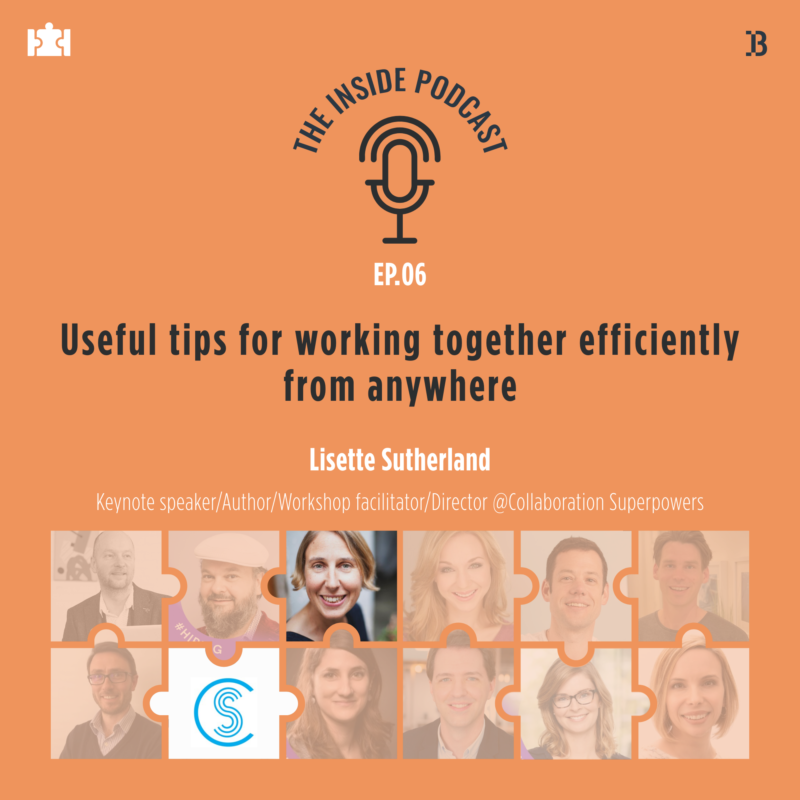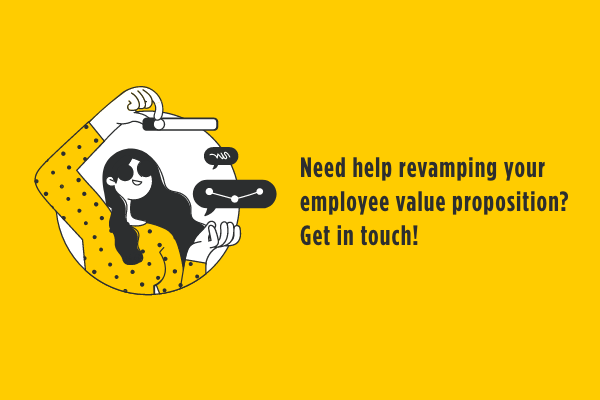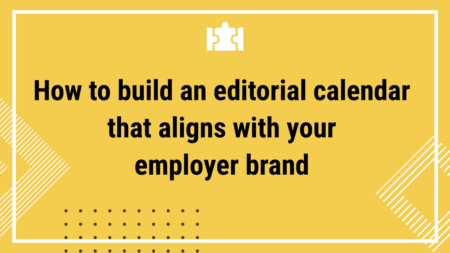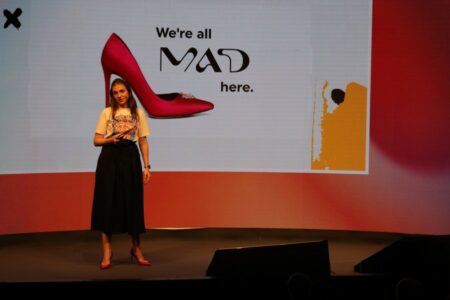Overview
Tune in for Ep.6 of Employer Branding: The Inside Podcast, Season 4!
In this episode, we had the pleasure of speaking with Lisette Sutherland about the #FutureOfWork, the hybrid workforce, and the importance of building boundaries when working remotely. Lisette is the founder of Collaboration Superpowers and the author of the book “Work Together Anywhere”. Throughout the podcast, we also talked about productivity, the importance of building boundaries when working remotely, how the function of the office is changing, and so much more. Enjoy!
What you’ll learn by listening
- Remote work: once a luxury, now a standard!
- What does the future of work hold?
- Living in the hybrid workforce
- Understanding productivity: “twilights” vs “night owls”
- The office 2.0: how the function of the office is changing
- Useful tips for working together efficiently from anywhere
- Creating a team “creed”: the holy grail of effective collaboration in a remote world
- The importance of building boundaries when working remotely
- Where do companies go wrong when it comes to remote work?
About the company
The mission of Collaboration Superpowers is to provide individuals, teams, managers, and owners a roadmap of how to work together anywhere — successfully.
Amassed from interviews with more than one hundred workers and managers/owners, Collaboration Superpowers provides a treasure trove of advice and action lists; tips, tools, and solutions; and personal reports of individuals and teams engaged in doing great things from wherever they happen to be.
Podcast link – Enjoy listening to The Inside Podcast, S04Ep.6!
Podcast transcription
Georgiana: Good morning, everyone. This is Georgiana with a new episode of Employer Branding: The Inside Podcast. Today I’m talking to Lisette Sutherland, who is a myriad of things. She’s a keynote speaker and author, a workshop facilitator, a TEDx speaker, but above all, a remote working champion for individuals, teams, and managers. And I think Lisette I will be, of course, allowing you to introduce yourself. But the best thing about what you do is that you talk about remote work and about how people can be their best while working remotely. Welcome to this podcast! Lisette, so good to see you again after six years.
Lisette Sutherland: Yeah, it’s been a long time. I still have my Technology Trendsetters magazine with me. So yeah, it’s exciting to like to see what’s happened in the last five years.
Georgiana: Exactly. It’s been such a long time, I have to say that I met Lisette in 2016, at a tech conference in Romania. And at the time, she contributed an article to an ebook that we created with my digital marketing agency at the time. So it’s a small world. And I have to say that Lisette has been a visionary, she was talking about remote work ever since 2016. So congratulations on that visit. And congratulations for actually maintaining and growing your company Collaboration Superpowers. But please tell me a little bit more about yourself if there’s anything I might have forgotten.
Lisette Sutherland: No, I think the only thing that didn’t get in there is that I was actually, just so people understand, like my cultural background, I was actually born and grew up in Germany for the first 10 years of my life, and then spent 25 years in the US, and then I moved back to Europe as soon as I could. And I’ve been in the Netherlands for 12 years now. So just so people understand, like my perspective of where I might be coming from,
Georgiana: Think about work before Corona and work as we are now living it. What would you say changed exactly in the meantime?
Lisette Sutherland: Yeah, we advanced five years in two years, right? Like we advanced a lot during Corona. And really before, I was telling people that I was trying to convince people that regardless of whether your company is in-person or remote, we should have the remote first processes in place to be able to work remote in case something happened. And I always said, I always used examples like weather, or sick kids or transportation problems. I never would have used a global pandemic as an example, because it would have seemed so extreme. But here we are, right? And there’s a global pandemic.
And I think every company saw the benefit of having remote-first practices now in place when everybody in the world had to go remote. And before remote work was seen really, as a luxury. And now it’s really seen as a standard. We don’t have to convince people anymore, that remote processes are good to have in place. Everybody has seen that that has happened. Also, all the people who thought that remote working wasn’t possible saw that when necessary, it was possible. It may not be what we want for our companies; it may not be the cultures that we have, but it is certainly possible. So now what I see is, the future of work is going to be choice, right? It’s a choice of the individual to work when and where they’re most productive.
And it’s also a choice for the company to decide how remote they want to be. Because there are some companies that really just prefer being in person like the culture is just better in person. And to those I say great, be in person, right? Like that is if that’s the culture of your company. And in fact, my husband works for a startup and he works in this big startup hub here in the Netherlands. And you can see that during the pandemic, some companies, some startups came back to the office because that was the culture and then there’s some that have just never been back. Like they went remote and it was fine. They’ve never looked back I don’t think their offices like the plants are all dead they’d like they just haven’t been back. So it really highlighted to me that there’s a preference. Just because you can work remotely, it doesn’t mean that you should because if your culture is to be in person then go with that, don’t fight it. You know, if people really want to be together, do that. So really, the future is a choice which I find so interesting.
Georgiana: I’m really curious because I know you had a few disciples so to say back in 2016 when I first met you, but I’m really curious how many of your clients were really into hybrid or remote work at the time? And how many of them are now?
Lisette Sutherland: Well, I would say that everybody was into hybrid at the time, but nobody was admitting it. I mean, we like I said, before, we all had like sick kids at home, or, you know, the package or the plumber, or whatever reason that we couldn’t make it to the office that’s been happening for, I mean, ever since offices existed, right? You can’t always get to the office for whatever reason.
But now it’s normal. And now what companies are seeing is that if they don’t offer flexibility, they’re losing their best talent. Because it’s not that people want to go travel the world or be digital nomads. I mean, you’re gonna see some of that, but everybody wants the flexibility. So now that we’ve seen that flexibility is possible that I think, you know, now it’s, we’re just admitting that hybrid was already happening. But now we’re sort of living it. I think that’s the difference. And in the past, I used to tell people like working from home, doesn’t mean that you’re not in communication with your office.
I mean, I think that’s the biggest change that sort of been is that before when you said, Oh, I’m going to work from home, it meant, I need a quiet day to myself in order to get some stuff done. And I’m not going to be at any meetings or go back to the office. And now that has totally changed work from home means you’re just going to or working from anywhere, right? You’re going to just work from another location, but you’re still in touch with your team, the expectation from everybody is that you’re going to be communicating and that you’re going to come to the meetings, regardless of where you’re working.
So I think that’s sort of been the biggest change; we’re just we’re admitting that hybrid was already a reality. It’s just a bigger reality now. And also, you see the hashtag on Twitter trending all the time, they call it the great resignation. And we’re seeing that globally. I mean, the US especially, but we’re seeing that globally, that if you’re not offering flexibility, there are so many jobs out there right now that are offering flexibility, and it’s easy to find them. So remote jobs in the past, like you’d have to go on Upwork. Or maybe they were low-paying, or it was hard to find. Now they’re everywhere. So if you don’t like your current company, your possibilities are endless. And I think that’s scary for a lot of companies.
Georgiana: Which is a good thing. I would say, in the end for the employees, at least. You know, we addressed a question in our ebook in 2016. And I’d like to address this question again, at the same time, quoting the answer you gave us at the time just to see if something has changed. Do you think in 5-10 years, we will have offices like we have today? Or do you think everyone will work remotely? And your answer was, “technology is making the traditional nine to five schedule unnecessary and less attractive for more and more people, especially the younger generation, the most important thing is working from where you are the most productive. Some people work better on the road, some at the beach, some from the office, and some from the comfort of their own homes. Everyone should choose what works best for them”. I would say it’s, it’s still pretty actual. Right?
Lisette Sutherland: Yeah, it’s still pretty actual. But I mean, more than ever. People are experts in their own lives and their own productivity like we know. And actually, one of the polls that I do with people is I ask them, Are you a daylight person or a sunrise person? Twilight or night owl? Like when are you most productive? And what has been surprised at first, I thought, Oh, this is just a cute icebreaker question. But the more I posed this question to more groups, what I found was only 40% of any particular group identifies themselves as a daylight person where they’re most productive during the day.
And what we know about the office is that it’s built for the nine to five, it’s built for the daylight people. So that means that 60% of the people are sort of being forced into this particular productivity schedule that doesn’t necessarily meet what their person when they’re personally most productive. So I find that hybrid really gives us the opportunity. Like if you’re a night owl, you could do you can be a night owl now. I mean, we still have to communicate with our team and you know, align with our teams and such. But we can now design our days for when we are most productive for the most part, and, and offices aren’t going anywhere. I just think that the function of the office is going to change like we still need to get together.
For everybody, it’s different rhythms, different times that some teams want to be together more than others, but the office is still going to be an important place for collaboration. But I think that they’re going to look more like co-working spaces in the future. Right? Like we don’t just come you know, some people are going to come every single day. Others are going to come once a week. But the function of the office, I think is fundamentally changing now, but before it was like the hub of where people got things done, and now it’s just one of many places that people go to get their work done.
And I think that’s a good thing. Because the more I sat in my home office during the pandemic, and I mean, I have a luxury office, right? I don’t have children, I’ve got like a huge office with green screens and lighting and all and all that stuff. But what I noticed was that I really missed going to other places, because, you know, you get ideas. Variety is the spice of life. There’s a reason for that, so I missed going to my coffee shop on Monday mornings, where I did all my invoicing and the boring stuff. And I, you know, I missed it was just, yeah, you need to have, I think most people need to be in a different place occasionally, just for inspiration purposes. I mean, that’s why we go on vacation, right? We want to see something new, taste new foods. The same is true for work, yeah, meet new people have new ideas, right and see, see all kinds of things. So I think that the same is true, like we still need our offices, it’s just that the function is going to change.
And then the one last thing that I would say to that is, what we saw during the pandemic was that productivity was not the issue. Like we all went, all companies went online and the remote workers, kept our companies afloat during this sort of global crisis. But what did change was that burnout was a huge problem, people were working more, right. And so that I think goes to show that there’s still a lot about remote working, that people need to learn, which is the boundaries and how to turn off and how to separate work from life. Those are so I think the challenges that people are facing now that the office very conveniently provided us with those boundaries before. So now, the problem is changed a little bit. But the function of the office, I think, is going to be an interesting one to watch.
Georgiana: And I think you’re less mentioned was actually quite on point, because I’m one of the people who find it hard to work with our kids at home. I mean, I’m sure it’s hard for everybody, but some people manage it better than I do. To me, if I spend one day at home working with my daughter at the same time, at the end of the day, I feel like I worked three days. It’s so draining and so tiring. And yeah, like you said, to me personally, work conditions have to be within certain boundaries, which I didn’t have. We’re in Corona, unfortunately.
Lisette Sutherland: Yeah, everybody’s, like one of my colleagues, she loves being at co-working spaces, and she’s got like, 50 tabs open, and she loves the noise around her and all the people and dogs coming by. For me, that would be just I would be nonfunctional in an environment like that. I really need the quiet and to be alone and think. And I think that the beauty of what we’re seeing now is people get to choose. If you want to be in that kind of environment, great, go do that. And if you need to be alone and focused, great. But the choice also causes trouble, because we have to learn how to make those choices, like what do we need to be productive is something that we really need to learn ourselves. And then that’s a challenge.
Georgiana: Yes. And I think one of the few good things that Corona did for us was that we managed to get to know ourselves better, and how do we function better? I know I did, for sure. Now I know where I can work from and what sort of conditions I need. And I think it’s sort of work the same way for everybody.
Lisette Sutherland: Yeah, it really forced us into like, oh, this working, like my husband hates working from home and Corona was so hard. As soon as the offices opened back up here he was back day one. He was back like he just couldn’t do it. So yeah, I think we just have to respect that we all have that.
Georgiana: Lisette, please tell me a little bit about your workshop “Work Together Anywhere”. What types of companies are the most suitable for this workshop?
Lisette Sutherland: You know, in the past, it was really focused on software development teams. And that’s mostly because they were the ones who already were going remote like they had, you know, and they were technology savvy and weren’t afraid of like pushing buttons and trying new things. But that has really broadened. Now I’m seeing a lot more HR and sales and lawyers, government agencies who are, you know, have really been behind the times and because they’re really limited by the technology they’re allowed to use and the systems. So I think a lot of companies are coming to the workshop. I’d say HR is really the one that surprised me the most. So HR is trying to really understand like, how do we make this new hybrid way of working work for our company and for everyone. So yeah, it started with software developers, and now it’s sort of broadening to wider channels.
But I think, I was actually talking with a friend last night who works at a government agency and he was telling me about the software that they’re allowed to use and not allowed to use and that their entire 800 person company is still running solely by communicating via email, and there’s like a limited amount like they can’t share certain size documents. And I mean, it was just it sounded like such a nightmare. And I told him, I said, come to my workshop, let me show you how much pain you’re in. And let me give you some inspiration for how much better it could be with just a few changes, right?
I think we’ve all gotten sort of used to, especially during the pandemic, when we had so few choices, we’ve all gotten used to working in a particular way. And now I think I’m seeing people who are just realizing like, it can be better, I’m just not exactly sure how it can be better. And so if that’s you, then definitely come to a workshop because it’s really an experience. It’s not just content being thrown at you, but like you’re experiencing what it’s like to be on a team and to visualize your work and to create an agreement together and, and doing all of that. So yeah, the workshop is a learning moment. But it’s more a learning experience, I would say.
Georgiana: You know, I’m an entrepreneur and a founder as well. And we all work remotely. I moved to Berlin about four years ago, and part of my team is in Romania, we also have one colleague working from Paris. And wondering, could you share two or three main things we should have in mind in order to make the best of this collaboration, which is already working quite well, for us since we’ve been active all this time. But you know, just a few tips.
Lisette Sutherland: So a couple of things. One thing that I’ve seen become really popular, and this goes back to what we were talking about before is people are creating personal user guides for themselves, one to just understand how we’re working, but also to communicate with our team, how we like to be worked with, or what we’re like to work with, for example. So I’ve created, for example, a personal user guide. And important things for people to know like about working with me, for example, is I really prefer it. Yeah, I really prefer communicating via email. Because I speak with so many people every year that I cannot remember conversations, I don’t know what it is about my brain, I’m just I just can’t do it. So email gives me a way to just look back and be like, Oh, okay, right, I remember this.
And so there’s a personal user guide, or like, I hate talking on the phone, hate it, you can call me 100 times I will never answer the phone, you know. So it’s like, separate if I know if it’s my husband or something like that. I love video calls. So. So I mean, that would be a good thing if you’re working with me. So those are the kinds of things I would say people can put in their user guides, like how, how I like to receive feedback, or how I’d like to give feedback, that kind of thing. But then to make that like we have to work with our teams, the biggest thing that I can say, the easiest thing, and the most bang for your buck, I guess you could call it is to create a team agreement together for how you’re going to work together. Right? So like, what kinds of information you’re going to share? How are you going to communicate with each other?
How do you know what each other are doing? Like? What are your expected response times? Or if the boss sends an email on the weekend? Does that mean that you have to answer it? Right? Or? Or are you allowed to take weekends off, like really just creating a basic set of agreements on how you’re going to work together will go a huge way, because everybody has their own expectations and their own productivity? And when you put it in a team agreement, it just sorts of takes away all the basic misunderstandings that you have out there. Like my colleague, to hear she answers emails so fast, like within minutes, you have an answer to your email.
I take 24 hours, sometimes even more. And so if you’re going to work together without knowing this about each other, it can be really frustrating. So having an agreement on like, what are your expected response times? And you know, what do you need to know? How we know what each other are doing is just going to take away a lot of misunderstandings. And then the other advice that I have comes from Cal Newport’s book, “Deep Work”. And this is more from an individual perspective. And what he says in that book is to be on and off. So when you’re on really be working, but when you’re off, be off, like don’t at 7 pm say like, Hey, I’ve got to just check my email one more time.
You know, and then three hours later, you’re still checking your email. So let’s create the boundaries for yourself on when you’re on and off. Because what we know about the brain is that it is important that it has time off in between work. If you’re going to be refreshed and productive the next day. So those are sort of the two big things. And then I would say during this sort of hybrid collaboration, you want to do regular feedback loops, right. Like as your way of working changes, you want to do regular retrospectives about how is the team doing, you know, and what and how, yeah. Is there anything that is there anything in the way? What does success look like for us? So I keep telling industries now like hybrid is evolving so quickly, the way that we’re working is evolving so quickly. You really want to put regular feedback loops in place to just get feedback from your team on how are things going. And are there things that we and improve as we go? So those are sort of the basic tips.
Georgiana: Yep. Yeah, definitely worth trying at least. Thank you. Very useful tips. And is now we’re getting to our last question, which is the following: where do companies go wrong when it comes to remote work?
Lisette Sutherland: Mandates. So and what I mean by that is, one of the things that we see right now with companies is that they’re mandating how many days people need to come back to the office. So they’re saying like, Okay, two days a week, you have to come back; or I’ve heard eight days a month, or 10 days per quarter. People are experts in their own lives and their own productivity. And I feel like we should leave it up to the individual teams to decide when and where they want to work. Companies can mandate things all they want.
But I think we have to remember that when the pandemic hit our workers, took our companies online and made it work, right. So now the fact that you’re mandating how they’re going to work, as we come back to this hybrid way of working, it just doesn’t make sense to do that. I mean, I understand why it’s happening. I think maybe there’s a little bit of fear there that people aren’t going to come back to the office. But I do really think that if the work requires you to be at the office, people will go to the office, right?
But if it doesn’t require that you’re there, and you don’t, that’s not where you do your best work. There’s no reason to force people back into that environment if we don’t really need it. So I’m, I see a lot of companies doing the mandates, but I’m not and I’m not a big fan of that. I think people are people are experts who have their own lives again. And yeah, and they know where to go to get the work done. If you need to go to the event. If you hate going to the office if you need to go to the office because your team requires it or there’s something that needs to it’s going to be better if you’re there people will go I firmly believe that everybody wants to do a good job. I mean, you’re always gonna have a few George Costanza is for those of you Seinfeld fans out there, right? There’s always gonna be somebody trying to get away with something. But that’s a different problem. That’s a totally different problem. Forcing people back to the office is not the way to go. I think people would be surprised at how good people are at managing their own productivity.
Georgiana: Yeah, it’s about autonomy. I think that’s one of the key secrets to good and healthy company culture.
Lisette Sutherland: Right? Totally, totally freedom. And that’s why people want remote to begin with. And it’s not because they don’t want to do the work and they don’t want to hide from it. It’s because they want to walk their kids to school, right? They want to eat a luxurious lunch for the foodies out there, right already trained for a marathon. It’s always just they want a little flexibility in their lives. So the mandates just don’t make sense, especially after the pandemic and what we saw our workforce is capable of doing. I think let’s let people be the professional adults we hired them to be.
Georgiana: Wow. Yeah. So many productive and useful insights you shared, Lisette! Thank you so much for this, how can people reach you?
Lisette Sutherland: I would say the best way is collaborationsuperpowers.com. I mean, you’ll see I’ve got a network of facilitators out there that we do. There are like 60 plus facilitators that are also giving the same workshops that I’m giving the collaboration superpowers, you’ll find all the information you need, your remote working success package, and all these different things. They’re all there but you also find information about me and the workshops that I give.
Georgiana: Perfect, thank you so much for accepting my invitation, and all the best. Thanks so much.
This was Employer Branding: The Inside Podcast. You can find our podcasts on Spotify on Apple podcasts and content on employer branding-related things on employerbranding.tech. Until the next time, stay tuned.







